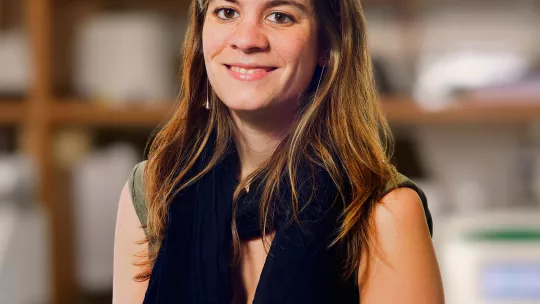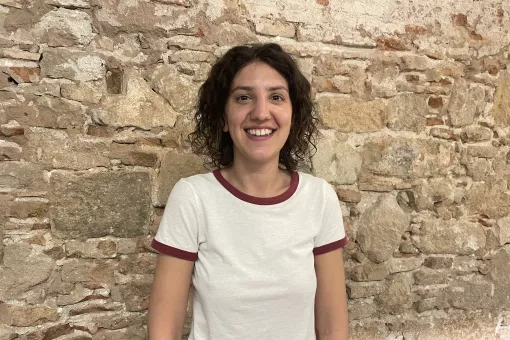Images
Begoña Cánovas is a biochemist and she holds a Master’s in Bioengineering. After a short stay in the Massachusetts General Hospital (Boston), she joined IRB Barcelona’s Signalling and Cell Cycle Laboratory (led by Ángel Nebreda) to do her PhD, which she completed in 2017. She continues to work in this lab as a postdoctoral fellow.
Regarding her research, she participates in various projects, all of which aim to unravel the role of the p38 MAPK protein in different fields, with a special focus on cancer biology.
Using cellular models, her work combines cellular and molecular biology techniques, flow cytometry, microscopy and multi-omics, among other tools, to decipher the underlying mechanisms driven by these proteins in each context. These approaches are complemented with in vivo studies to further analyse the relevance of their findings and consider their potential transfer to clinical practice.
Begoña is the first author of a review published in Nature Reviews Molecular Cell Biology: "Diversity and versatility of p38 kinase signalling in health and disease", co-authored with Ángel Nebreda. We have asked her some questions about this publication.
What is p38 and why is it important?
p38 is a protein classically involved in cellular response to stress. Given that every cell in the body is subjected to different degrees of stress during its lifetime, p38 emerges as an important player in the homeostasis of our body.
Taking this into account, and considering that different diseases, including cancer, are characterised by a high level of stress, it is not surprising that this protein often pops up when studying pathologies at the molecular level.
How would you define "kinases" and why are they involved in cellular response to stress?
Kinases are proteins that are able to control the function of other proteins and therefore modulate several processes in the cell. They can be seen as key regulators of executor arms. When cells are stressed, kinases are a fast and accurate tool to try to restore normality.
How long have you been working on p38 and, specifically, how long in this article?
I have been working on p38 during all my time at IRB Barcelona, but this review has been in our minds, hands and screens intermittently for around 7 months.
What are, in your opinion, your contributions to the field of cell stress after your article published in Nature Reviews as first author?
Our main message is that, in contrast to what many people think, p38 is more than a protein that senses environmental or harsh stresses. We wanted to give a physiological perspective of what p38 does in our body and highlight that, despite not being essential for many processes, it is necessary to fine-tune a lot of them, and we really need our body to function like a Swiss clock.
We not only describe what is known about this protein in a comprehensive way, but also try to rationalise the diversity of p38 functions, the apparent contradictory findings in the field, and why, after being almost forgotten by pharma companies, some inhibitors of this pathway are currently being considered to treat various pathologies.
About IRB Barcelona
The Institute for Research in Biomedicine (IRB Barcelona) pursues a society free of disease. To this end, it conducts multidisciplinary research of excellence to cure cancer and other diseases linked to ageing. It establishes technology transfer agreements with the pharmaceutical industry and major hospitals to bring research results closer to society, and organises a range of science outreach activities to engage the public in an open dialogue. IRB Barcelona is an international centre that hosts 400 researchers and more than 30 nationalities. Recognised as a Severo Ochoa Centre of Excellence since 2011, IRB Barcelona is a CERCA centre and member of the Barcelona Institute of Science and Technology (BIST).






